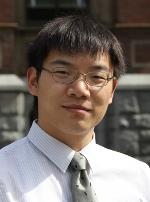Event
Inorganic Chemistry Seminar: Dr. Chong Liu
"Non-equilibrium chemical and biological systems with microscopic electrochemical control"

Dr. Chong Liu
UCLA
Electrochemical nanomaterials have witnessed extensive applications in catalysis, energy storage, and conversion. In this talk, I will present some new synergies from electrochemical nanomaterials that enable new applications in both catalysis and microbiology. Because electrochemical nanomaterials spatiotemporally control the microscopic concentration profiles of chemical species, we envision electrochemistry at the microscopic scale as a viable tool for transducing electronic signals into controlled non-equilibrium systems. Aided by the machine-learning-based inverse design, we will discuss how to establish catalytic reactions of seemingly incompatible steps, as well as how to mimic and perturb the extracellular space in microbiology. The ubiquity of non-equilibrium systems in chemistry and biology suggests much more applications of electrochemically controlled spatiotemporal heterogeneity in the future.
The Liu Lab is located in the Department of Chemistry and Biochemistry, University of California, Los Angeles. We are an inorganic chemistry lab with specific interests in electrochemical systems for energy, biology, and environments. Combining our expertise in inorganic chemistry, nanomaterials, and electrochemistry, we aim to address some of the challenging questions in catalysis, energy conversion, CO2/N2 fixation, and microbiota. Interested students and researchers should contact chongliu(a)chem.ucla.edu for positions in the lab.
Bio
Chong Liu received his B.S. degree in Chemistry at Fudan University, China, under the supervision of Prof. Dongyuan Zhao for the synthesis of mesoporous materials. Under the supervision of Prof. Peidong Yang, he obtained his Ph. D. degree in Chemistry at the University of California, Berkeley. His Ph.D. thesis focuses on the development of artificial photosynthetic systems of nanowires with a variety of building blocks, including microorganisms, for solar-powered reactions of water-splitting and CO2 fixation. He then worked at Harvard University under the supervision of Daniel Nocera as a Lee Kuan Yew postdoctoral fellow. At Harvard, Chong developed hybrid biological-inorganic systems, dubbed as the bionic leaf, for efficient fixation of CO2 and N2 powered by sustainable electricity. In 2017, Chong started his independent career as an assistant professor at UCLA Chemistry & Biochemistry. His research group aims to employ electrochemical nanomaterials to create microscopic non-equilibrium systems for applications in chemistry and biology.
HOST: Mallouk
